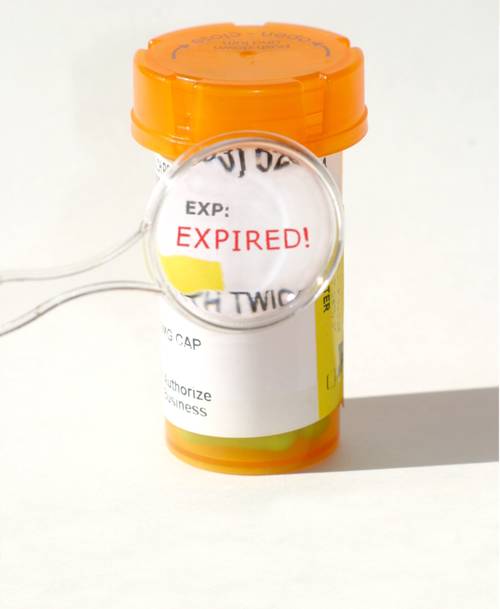As the new year begins, it is essential to take a moment to assess our medicine cabinets and ensure the safety and effectiveness of the medications we have stored. Checking medicine expiration dates is a vital step in maintaining our health and well-being. Expired medications can not only lose their potency and effectiveness but also pose potential health risks. In this article, we will explore the importance of checking medicine expiration dates, the potential risks of consuming expired medicines, and provide guidelines for effectively checking and managing medication expiry dates. By following these steps and taking proactive measures, we can maintain a safe and reliable medicine inventory throughout the year.

New Year, Same Safety
Ron Wright
Importance of checking medicine expiration dates:
Ensuring medication effectiveness
When it comes to taking care of our health, we want to make sure that the medications we rely on are actually doing their job. That's why checking medicine expiration dates is so important. Medicines can lose their effectiveness over time, and taking expired medication may not provide the relief or treatment you need. By checking the expiration dates regularly, you can be confident that your medicine is still potent and will work as intended.
Minimizing potential health risks
Checking medicine expiration dates is not just about effectiveness, it's also about safety. Expired medications may not only be less effective, but they can also pose potential health risks. Over time, the chemical composition of medications can change, leading to the development of harmful compounds. Consuming expired medicines may have unintended consequences and could potentially worsen your condition or cause unwanted side effects. By being proactive and checking expiration dates, you can minimize these risks and prioritize your well-being.
Potential risks of consuming expired medicines:
Decreased potency and effectiveness
Just like that forgotten jar of pickles at the back of the fridge, medicines have an expiration date for a reason. As time passes, the active ingredients in medications can degrade, resulting in decreased potency. This means that the medication may not work effectively or may require a higher dosage to achieve the desired effect. Taking expired medicine could be like trying to fight a dragon with a wet noodle - it's just not going to be as effective as you'd hope.
Development of harmful chemical compounds
Expired medicines can also undergo chemical changes that lead to the development of potentially harmful compounds. These compounds can be detrimental to your health and may
cause adverse reactions or unexpected side effects. It's like playing a game of chemistry roulette; you never know what could happen when expired medications start mixing it up in your body. To avoid any unwelcome surprises, it's best to stick to medications within their expiration dates.
Steps to effectively check medicine expiration dates:
Examining labels and packaging information
Checking medicine expiration dates is a breeze if you know where to look. Start by examining the labels and packaging of your medications. Most medications have the expiration date printed clearly on the packaging or the bottle itself. Make sure to look for it in a well-lit area because squinting at tiny print is nobody's idea of a good time
Understanding different expiration date formats
Expiration dates may come in different formats, so it's important to know what they mean. Some dates might be a specific day, month, and year, while others could be in a month and year format. There may even be abbreviations like "EXP" or "Do Not Use After" preceding the date. Take a moment to familiarize yourself with the different formats and what they represent. It’s like learning a new language, except instead of ordering coffee, you're making sure you don't accidentally consume expired medication.
Proper storage and handling of medications:
Optimal storage conditions for different medications
To ensure that your medications retain their potency and stay safe to use, proper storage is key. Different medications have different storage requirements, so it's important to follow the instructions provided on the packaging. Some medications need to be kept in the refrigerator, while others prefer a cool, dry place. Don't let your medicine feel like Goldilocks trying to find the perfect spot – give it the optimal conditions it deserves.
Preventing contamination and degradation
Besides proper storage, it's also essential to prevent contamination and degradation of your medications. Make sure to store them in their original containers to avoid any accidental mix-ups or confusion. Keep them away from extreme temperatures, moisture, and sunlight, as these factors can compromise the integrity of the medication. And remember, just because your medicine survived a tumble in the gym bag doesn't mean it should be your designated workout buddy. Keep your medications safe and separate from potentially harmful situations.Now that you know why it's important to check medicine expiration dates, the potential risks of consuming expired medications, how to effectively check those dates, and how to properly store and handle your medications, you can take charge of your health with confidence. No more playing medication guessing games – keep those expiration dates in check and stay on top of your well-being.
Common misconceptions about medicine expiration dates:
Myth: Expiration dates are arbitrary
We've all seen those dates printed on the back of medicine bottles, but have you ever wondered if they're just a suggestion? Well, the truth is, expiration dates are not arbitrary. They are carefully determined through scientific testing to ensure the safety and effectiveness of the medication. So, it's important to take them seriously and not brush them off as mere suggestions.
Myth: Medications are safe to use indefinitely
Ah, the old "I've had this pill for years, it should still be good!" misconception. Unfortunately, medications do have a limited shelf life. Over time, they can deteriorate and lose potency, making them less effective or potentially harmful. So, it's crucial to heed those expiration dates and avoid using medications that are past their prime.
Guidelines for disposing of expired medications:
Safe disposal methods
When it's time to bid farewell to those expired medications, don't just toss them in the trash or flush them down the toilet. Instead, opt for safe disposal methods. Many pharmacies and local law enforcement agencies have take-back programs where you can drop off your expired or unused medications. If that's not available in your area, mix the medicine with an undesirable substance (like kitty litter or coffee grounds), seal it in a bag, and throw it in the trash.
Environmental impact of improper disposal
Improper disposal of medications can have harmful effects on the environment. Flushing them down the toilet or pouring them down the sink can contaminate water sources and harm aquatic life. So, it's essential to dispose of medications properly to protect both our health and the environment. Let's not leave a trail of expired pills in our wake!
Importance of updating your medicine cabinet at the new year:
Ensuring access to effective and safe medications
The start of a new year is the perfect time to give your medicine cabinet some much-needed attention. Checking the expiration dates ensures that you have access to medications that are both effective and safe. You don't want to be caught in the middle of the night with expired cold medicine when you're feeling under the weather!
Reducing clutter and organizing medications
Let's face it - our medicine cabinets can quickly become a jumbled mess of expired medications, half-used tubes of ointment, and mystery pills. Updating your medicine cabinet at the new year
allows you to declutter and organize your medications, making it easier to find what you need when you need it. Plus, it frees up space for that new fancy face cream you've been eyeing!
Tips for maintaining a safe and effective medicine inventory:
Regularly reviewing and updating medication stock
To avoid finding a stash of expired medications every time you clean out your medicine cabinet, it's important to regularly review and update your medication stock. Check those expiration dates periodically and dispose of any expired medications promptly. By staying on top of it, you can ensure that your medicine inventory is always safe and effective.
Establishing a system for tracking expiration dates
We're all guilty of forgetting when we bought that bottle of pain relievers or allergy medication. That's why it's helpful to establish a system for tracking expiration dates. Consider using labels or markers to write the purchase date on medicine bottles, or create a digital reminder to check the expiration dates annually. With a little organization, you can avoid any medication-related mishaps and keep your medicine cabinet in tip-top shape.In conclusion, regularly checking medicine expiration dates is a simple yet crucial practice to ensure the safety and effectiveness of the medications we rely on. By following the steps outlined in this article, we can minimize the risks associated with expired medicines and maintain a well-organized and up-to-date medicine cabinet. Remember, a little effort in checking and managing expiration dates can go a long way in safeguarding our health and well-being. Take the time at the new year to review your medicine inventory, dispose of expired medications properly, and stay informed about the best practices for storing and handling your medications. Your health is worth it.
Frequently Asked Questions
1. Why is it important to check medicine expiration dates?
Checking medicine expiration dates is essential because expired medications may lose their effectiveness or even become harmful. Using expired medicines can potentially lead to inadequate treatment or adverse reactions that may compromise your health.
2. Can I still use medications after the expiration date?
It is generally recommended to avoid using medications after their expiration dates. The potency and efficacy of the medicine cannot be guaranteed beyond that point. It is best to consult with a healthcare professional or pharmacist for guidance on proper disposal and obtaining a fresh supply.
3. How should I dispose of expired medications?
Proper disposal of expired medications is crucial to prevent accidental ingestion or environmental contamination. Many pharmacies and healthcare facilities have medication
take-back programs that ensure safe disposal. If such programs are not available, it is advised to follow specific guidelines for home disposal, such as mixing medications with undesirable substances like coffee grounds or cat litter before sealing them in a bag and disposing of them in the trash.
4. Can I rely solely on the expiration date printed on the packaging?
While expiration dates are generally reliable indicators of a medication's shelf life, it is essential to pay attention to storage conditions as well. Factors like exposure to light, heat, or moisture can accelerate the degradation of medications. Always store medicines in appropriate conditions and discard them if there are any noticeable changes in color, smell, or consistency, regardless of the expiration date.
